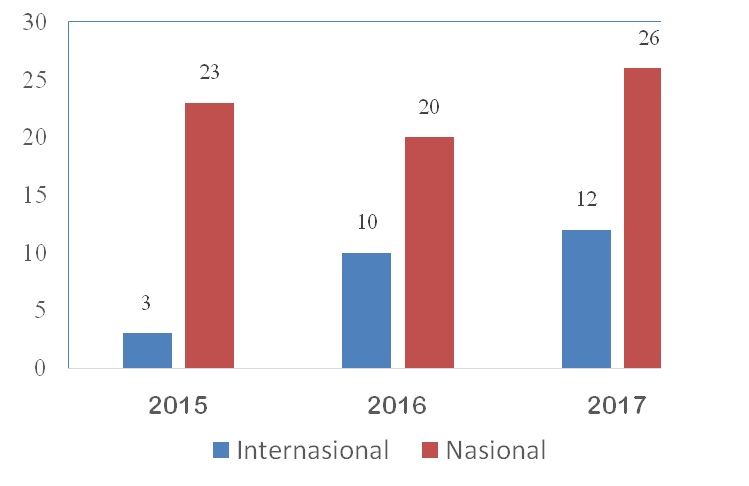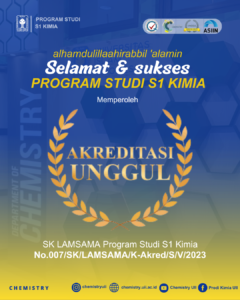The quality of students and graduates, including character building and academic and non-academic achievements, is very important in a higher education institution. Recognizing the importance of this, student development is carried out at the university, faculty and study program levels. Student development at the university level is facilitated and coordinated by the UII Directorate of Student Affairs which is under the coordination of the Vice Chancellor for Student Affairs. The improvement of organizational ability is accommodated through student institutions at the university and faculty level, namely the Student Representative Council (DPM) and the Student Executive Institute (LEM), as well as the Chemistry Student Association (HMK) at the Study Program level. In the context of fostering student independence and creativity, UII provides various curricular, co-curricular and extra-curricular student activities. These various activities are appreciated by giving weight as an integrated participatory work unit (SKP) as part of the Ulil Albab Curriculum.
At the Faculty level, creativity development is carried out through various annual routine programs, including scientific writing workshops, journalism workshops, student creativity program workshops and national level Olympic coaching. At the study program level, there is a student development unit, namely the Chemistry Student Competition Center (CSCC). The CSCC unit is an institution consisting of Chemistry Study Program students who coordinate all training activities and preparation for competitions in both academic and non-academic fields. In its implementation, funding support and guidance by supervisors is given to CSCC. The increase in student achievement of the Chemistry Study Program in various competitions and championships of more than 84 student achievements was carved by Chemistry Study Program students both nationally and internationally in the last 3 (three) years with the distribution as shown in Figure 1.

Figure 1. Achievement of Chemistry Study Program students
From Figure 1. it can be seen that the increase in student achievement was achieved from 2015 to 2017 both quantitatively and qualitatively. Quantitatively, the number of achievements has increased from year to year and qualitatively seen an increase in the number of international achievements. In 2015 there were 3 international achievements and increased to 10 achievements in 2016 and 12 achievements in 2017. A very proud achievement was achieved through the South East Asia Global Innovation Challenge (SEAGIC) by winning a silver medal and Favorite Team in 2015, Best Poster in 2016 and a gold medal in 2017 by a delegation of students from the Chemistry Study Program. This is a very prestigious achievement because the organizer of the event is the American Chemical Society (ACS) Malaysia Chapter which was attended by more than 5 (five) countries. In addition, at the national level, the increase in achievement is shown by the increase in the number of finalists for the National Student Scientific Week (PIMNAS) from 1 team in 2015 and 2016 to 2 teams in 2017. The number of teams that received funding through the Student Creativity Program (PKM) also experienced a very significant increase from a total of 14 teams in 2015, 6 teams in 2016 and 19 teams in 2017.
Student Engagement in Relevant Commissions
The number of students involved as administrators of student institutions (DPM and LEM) at the university level is around 100 students. While the students involved in DPM and LEM at the faculty level are around 75 students per faculty. At the study program level, the Chemistry Student Association (HMK) has a board of about 50 students who are divided into several management divisions. Students can also develop through activities in the Student Activity Unit (UKM). Among them are student regiments, Islam and language, entrepreneurship, journalism, nature lovers, religious activities, scientific activities and student reasoning, peer counseling as well as arts and sports.
Extracurricular activities
Several extra-curricular activities at the university level in various fields are used to accommodate interests and talents, as well as to train student cooperation. Some student activities at the university level include:
1. Islam and Arabic (Al-Markazi Community);
2. Arts (Marching Band, student choir, photography);
3. Sports (football, basketball, futsal, martial arts);
4. Language (Central Language Improvement);
5. State defense (Student Regiment);
6. Entrepreneurship (Student Cooperative and Ibisma);
7. Student press (LPM Himmah);
8. Peer counseling (PIKM);
9. Scientific activities and student reasoning (Labma, UII-MUN);
10. Marketing and Communication.




